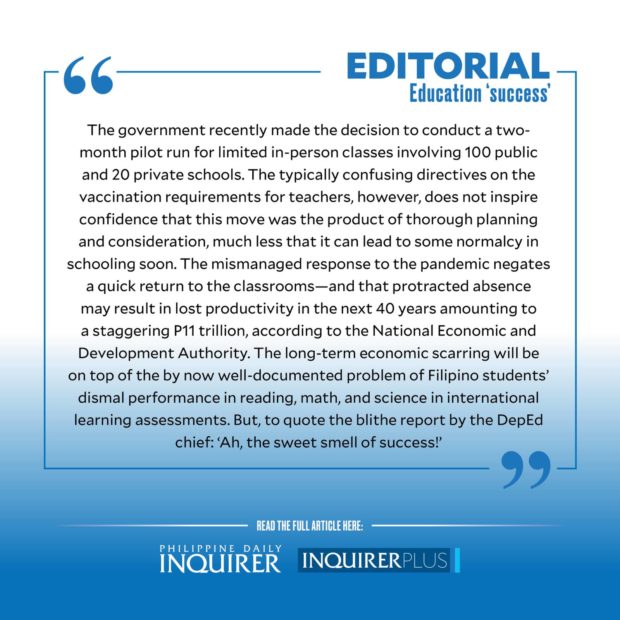Education ‘success’

Last Sept. 13, Education Secretary Leonor Briones declared that the Department of Education (DepEd) “celebrates with great joy its success” in opening another academic year under the blended or distance learning setup — the second amid the devastating and prolonged COVID-19 pandemic.
“Ah, the sweet smell of success!” Briones exclaimed during the livestream of DepEd’s National School Opening Day program, “We opened classes last year. We successfully ended them. Now we are opening another school year. Isn’t that success worthy of celebration?”
If only. For many public school teachers, legislators, education stakeholders, and activists, the answer is a resounding “no” given the dire straits the public education sector continues to be mired in, no thanks, as they point out, to DepEd’s glaring shortcomings.
“What’s there to celebrate? Another school year of school closure, making the Philippines one of the last in the world to reopen schools amid the pandemic? The lack of gadgets and ample internet support to teachers and students? The still insufficient modules? The millions of children who are yet to enroll?” said the Alliance of Concerned Teachers (ACT).
As of last week, Briones said there were 25.582 million students enrolled for school year 2021 to 2022, short of the 26.227 million who enrolled last year, although registration has been extended to today.
The Philippines is the only country in Asia still on virtual mode, and the basic education sector continues to be hobbled by a vast array of issues, from problematic self-learning modules to inadequate teacher support to unequal access to internet connectivity, which has further widened social inequities. ACT urged Briones to attend to the “glaring problems” hounding the sector instead of “patting yourselves on the back for doing the bare minimum of reopening classes while failing to address major issues in education.”
The Commission on Audit, for one, recently rapped the DepEd for failing to secure on time the delivery of P5.53 billion worth of computers, textbooks, and other learning materials it was supposed to have bought in 2020 and even earlier from the Procurement Service of the Department of Budget and Management—the same PS-DBM involved in Congress’ current investigation into Pharmally Pharmaceutical Corp. These items were supposed to have been distributed to public elementary and high schools nationwide as public education shifted online amid the COVID-19 health crisis, and yet were either delayed or undelivered.
Despite such neglect, DepEd has gone to Congress asking for another P33 billion next year for laptops and P4 billion for data connectivity for another year of distance learning. DepEd Undersecretary Alain Pascua claimed during the House budget hearing that 353,359 laptops had already been delivered or procured for public school teachers from 2019 to Bayanihan 2, meaning that some 34 percent of the teachers should now be using DepEd-issued laptops. This claim was quickly disputed by ACT, which said it was “far from the truth” and “does not align” with its own findings that only 7 percent of teachers from the National Capital Region and 14 percent in other regions will be using government-issued laptops this year. “So we ask DepEd, in the spirit of transparency, where are these laptops?” demanded ACT Secretary General Raymond Basilio.
Much like health workers at the medical frontlines, overburdened public school teachers are also not getting the support they need to do their job properly amid the pandemic. The DepEd promised them overtime pay back in June for having worked on self-learning materials and preparing loads of paperwork before the opening of the previous academic year, but that promise remains unfulfilled.
“Will it be another case of ‘thank you’? Is it always going to be like that?… DepEd, you should be ashamed [for] it is [us] who literally shouldered your so-called learning continuity plan,” lamented ACT NCR Union president Vladimir Quetua.
The government recently made the decision to conduct a two-month pilot run for limited in-person classes involving 100 public and 20 private schools. The typically confusing directives on the vaccination requirements for teachers, however, does not inspire confidence that this move was the product of thorough planning and consideration, much less that it can lead to some normalcy in schooling soon. The mismanaged response to the pandemic negates a quick return to the classrooms—and that protracted absence may result in lost productivity in the next 40 years amounting to a staggering P11 trillion, according to the National Economic and Development Authority. The long-term economic scarring will be on top of the by now well-documented problem of Filipino students’ dismal performance in reading, math, and science in international learning assessments.
But, to quote the blithe report by the DepEd chief: “Ah, the sweet smell of success!”





















